Australia and New Zealand have the highest rates of melanoma in the world, according to the Melanoma Institute Australia. An aggressive form of skin cancer, melanoma kills more young Australians aged 20 to 39 years old than any other single cancer, with stats estimating 1 in 14 men and 1 in 24 women in Australia will be diagnosed with melanoma in their life.
With the mantras slip, slop, slap and no hat, no play a constant through childhood, it would be fair to say most young Australians in particular are aware of the dangers of the sun and skin cancer, and may have even looked at a spot on their body before and thought they should get it checked out at some point – actually taking the next step and going to the doctor is another story.
Taking that next step is crucial, however: if melanoma is identified at an early stage, simple treatment can result in a complete cure.
Looking to make it easier than ever is New Zealand healthtech startup Firstcheck, which has created an app through which users can snap a few pictures of a mole they are concerned about, choose a dermatologist or skin specialist to review their case, and receive feedback within three days.
The startup was born at a health-focused Startup Weekend in Wellington in 2015, with the idea coming to cofounder Hayden Laird as his grandfather had just had a melanoma removed and his wife had just had been to a MoleMap clinic, where a patient can have photos of spots taken by nurses and sent to dermatologists for diagnosis.
“I thought what if everyone, not just MoleMap nurses, could send photos to skin specialists for review? There just seemed this huge opportunity to improve access to skin specialists to improve skin cancer outcomes. The missing pieces were the empowering tools needed by people to proactively manage their skin health,” Laird said.
Taking the idea for Firstcheck past the Startup Weekend, Laird, cofounder Frank Lachmann, and the growing team first spent time looking to understand telemedicine, best practice in teledermatology, and the regulatory space governing it all across Australia and Australia.
“The underlying concept may seem relatively simple, connecting patients with local skin specialists for a remote doctor consultation, but in the medical field, nothing is simple, and at times the regulatory environment and industry, complete with its politics, was daunting,” Laird said.
The startup brought on industry advisors including dermatologist Ian Coutts, doctor Tom Mulholland, and health IT and medical advisor Kevin Sheehy to help it navigate the landscape and recruit specialists.
“Being a startup from Taranaki, coming from outside the industry, and being cutting-edge, we had the challenge of finding early adopters in a traditionally conservative industry,” Laird admitted.
“Then there was the challenge of winning the trust of doctors that have developed a healthy scepticism from all their dealings with pharmaceutical companies. So, there was no room for errors and, in testament to the team, we have had a smooth ride.”
The Firstcheck app works by having a user choose whether they want the dermatologist to review a ‘Mole’, ‘Rash’, or ‘Other’, then guiding them to take a photo, first from 20cm away and again from 10cm away. The app can be paired with a ‘SkinScope’, a $30 alternative to a dermoscope used by dermatologists, which allows for a magnified image to be taken.
Once the pictures are taken, the app asks the user to show on a mannequin where on the body the photos were taken, and detail any additional information that may help the dermatologist, such as how long they have had that mole or rash. The user is then asked to pick a specialist, pay the $19.95 fee, and then wait for their results, where the dermatologist may urge an in-person consultation for further review or advise the patient around what they should keep an eye on.
The app can also be used for ‘DIY mole mapping’, allowing users to take photos of spots and track any new spots or changes.
The Firstcheck app and SkinScope launched in New Zealand last November, during Melanoma Awareness Week, and in Australia earlier this year, with the startup having secured NZ$500,000 in funding from angel investors including Catalyst Capital, Angel HQ, and Launch Taranaki.
According to Laird, Firstcheck has been adopted by GPs and other health professionals who are using it to submit cases to dermatologists; beyond the $19.95 fee users pay, clinicians are able to set prices between themselves, and as such Firstcheck’s fee varies according to this.
“Not every doctor has the same needs, or wants to use Firstcheck in the same way. We have deliberately made the system flexible to accommodate this,” Laird said.
Following its Australian launch, Laird said the startup hit 10,000 app downloads; a few corporates have also made Firstcheck available to employees as part of either their wellness or health and safety programs. A number of health professionals are also recommending to patients the SkinScope to assist with regular checkups between in-person visits, Laird added.
Given the prevalence of melanoma and the importance of early detection, there are a couple of others startups working in this space around the world.
Amsterdam-founded app SkinVision, for example, has an algorithm analyse a user’s photos to calculate different growth patterns of skin tissues to determine the ‘potential chaotic growth of pigmented and non-pigmented skin lesions’ and then provide a green, yellow, or red risk rating.
Scientists at Stanford University also announced earlier this year the results of their diagnosis algorithm for skin cancer; training it to visually diagnose potential cancer through a database of 130,000 images, the algorithm was then tested against 21 board-certified dermatologists.
The algorithm matched the performance of dermatologists in its diagnoses of skin lesions, however given it was trained on high-quality medical images rather than smartphone-quality photos, it is not yet ready for consumers.
For Laird, however, facilitating diagnosis by an actual professional is key.
“Shortcuts put both the patient and clinician at risk. Firstcheck is the first app of its kind and its network of local skin specialists is unique, as is the very affordable SkinScope,” he said.
“From the clinician’s perspective, with no software setup costs and an affordable dermoscope, teledermatology, with all its benefits, is now accessible to everyone, and that’s something Firstcheck is very proud of.”
Image: the Firstcheck team. Source: Supplied.











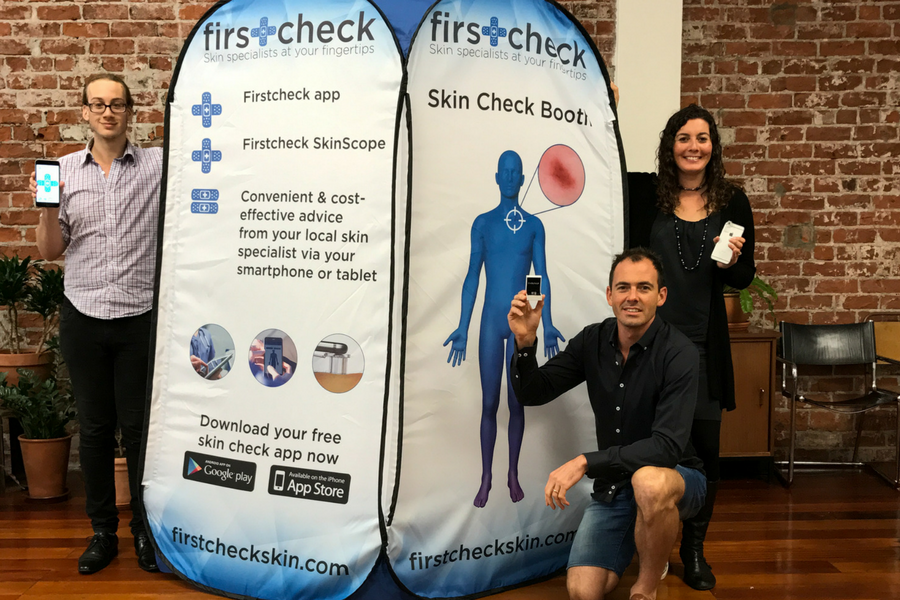
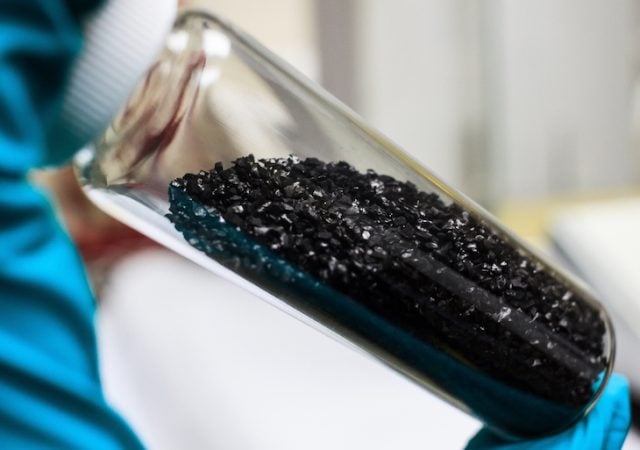
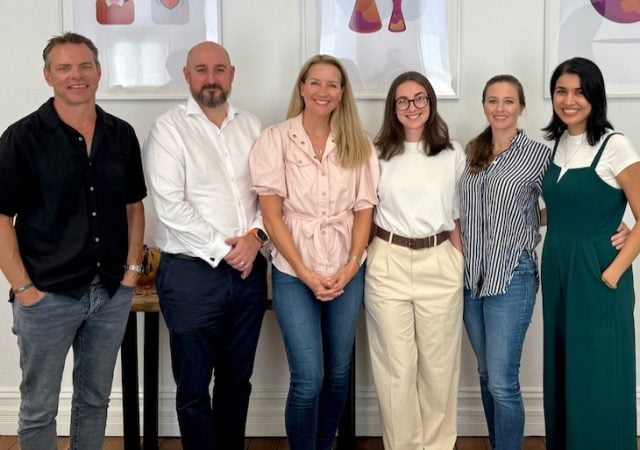
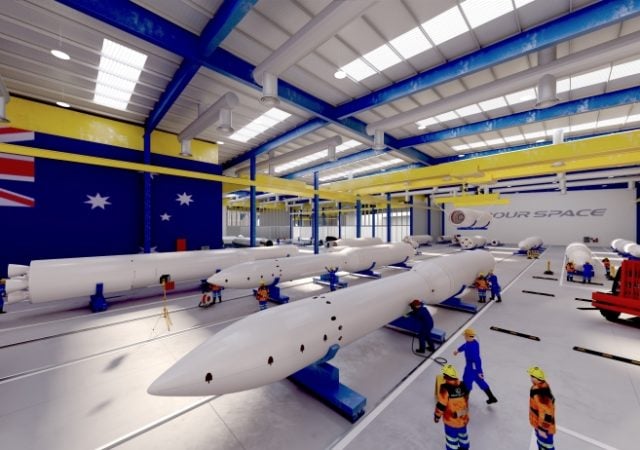

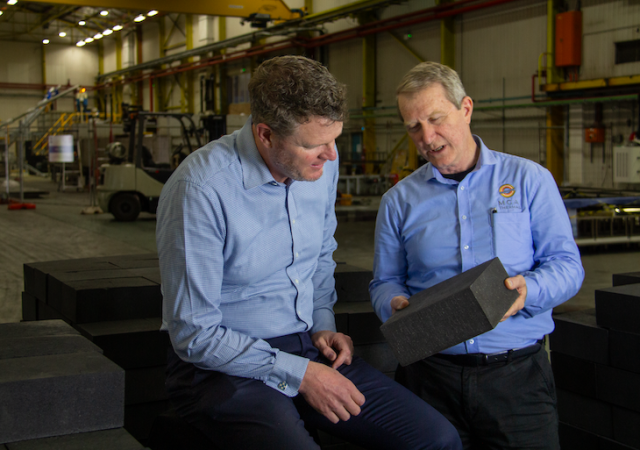


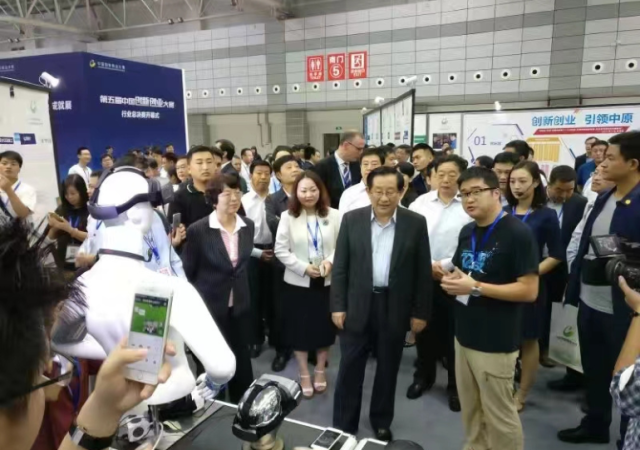
Trending
Daily startup news and insights, delivered to your inbox.